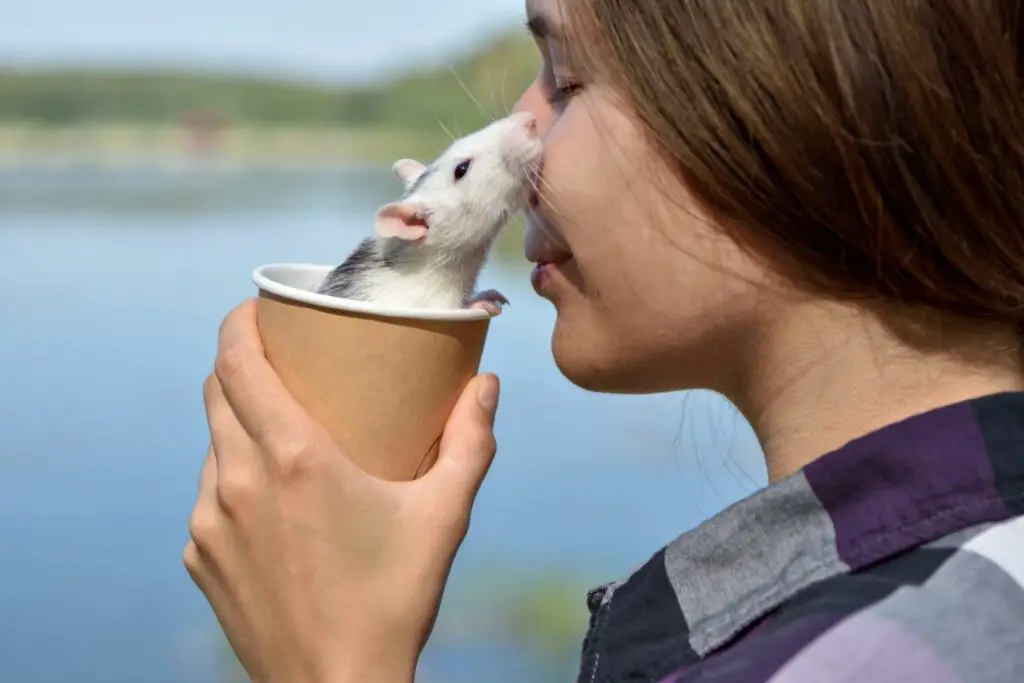As a veterinarian who owns and loves pet rats, I’ve noticed that one of the most endearing behaviors of these little creatures is their tendency to lick their owners. But what does this behavior mean? Is it a sign of affection, or is there something else going on?
In this blog post, I’ll explore the reasons behind why rats lick their owners, and what this behavior can tell us about the relationship between rats and humans.

Rat Behavior
Before we can understand why rats lick their owners, we need to understand a bit about their overall behavior. Rats are social animals that form close bonds with their owners. They are affectionate and love to play, and will often communicate with their owners through a variety of vocalizations and body language.
Rats are also highly intelligent and curious animals that thrive on stimulation and interaction. They need plenty of opportunities for play and exploration, as well as regular attention and affection from their owners.
Licking Behavior in Rats
So what does it mean when a rat licks its owner? In general, licking is a sign of affection and bonding in rats. When a rat licks its owner, it is showing that it trusts and loves them. This behavior is similar to the way that dogs lick their owners, as a way of showing affection and seeking attention.
There are several different types of licking behavior in rats, each with its own meaning. For example, some rats will lick their owners as a way of grooming them, while others will lick as a way of begging for food or attention. Still others may lick as a way of expressing anxiety or stress.
What triggers licking behavior in rats? Generally, rats will start licking their owners when they are feeling content and relaxed. This might happen when the owner is petting or playing with them, or when the rat is snuggled up with its owner for a nap.
The Science Behind Rat Licking Behavior
While we can observe and interpret rat behavior based on their actions, there is also a physiological basis for why rats behave the way they do. Hormones, in particular, play a big role in rat behavior, and can affect everything from their mood to their social interactions.
Studies have shown that rats produce a hormone called oxytocin when they interact with their owners. Oxytocin is sometimes called the “cuddle hormone” because it is released when we hug or snuggle with someone we love. This hormone helps to strengthen the bond between rats and their owners, and may be a key factor in why rats are so affectionate towards people.
Early experiences can also play a role in rat behavior. Rats that are raised in a nurturing and social environment are more likely to be affectionate and responsive to their owners than rats that are raised in isolation or with little social interaction.
The Benefits of Rat Licking
So why is rat licking behavior so important? There are several benefits to this behavior, both for the rat and for the owner. For the rat, licking behavior can be a way of reducing stress and anxiety, as well as a way of strengthening the bond between the rat and its owner.
For the owner, rat licking can be a therapeutic experience. Many people find the sensation of a rat’s tongue on their skin to be soothing and relaxing, and the act of bonding with a pet can be a great stress reliever.
Finally, rat licking behavior can help to strengthen the bond between owner and pet. When a rat licks its owner, it is saying “I trust you and I love you.” This kind of bonding experience can be incredibly rewarding for both the rat and the owner.
Addressing Concerns About Rat Licking
Of course, some people may have concerns about rat licking behavior. There are a few common concerns that I’d like to address here.
First, some people worry about hygiene issues related to rat licking. While it’s true that rats can carry bacteria and other pathogens, the risk of contracting a disease from a pet rat is relatively low. If you are concerned about hygiene, you can take steps to minimize the risk of infection by washing your hands after handling your rat, keeping their living area clean, and avoiding contact with wild rats or other animals.
Second, some people worry about the risk of disease transmission through rat bites or scratches. While it’s true that rats can bite or scratch if they feel threatened or stressed, this behavior is relatively rare in well-socialized pet rats. If you are concerned about being bitten or scratched, it’s a good idea to handle your rat gently and to avoid startling or frightening them.
Conclusion
In conclusion, rat licking behavior is a sign of affection and bonding in these social and intelligent creatures. By understanding the reasons behind this behavior, we can deepen our relationships with our pet rats and provide them with the love and attention they need to thrive. If you’re considering getting a rat as a pet, I encourage you to learn as much as you can about their behavior and needs, so you can provide them with the best possible care and attention.
- How Long Do American Eskimo Dogs Live? Important Factors and Care Tips - September 29, 2023
- Do American Bulldogs Need Grooming? Essential Tips and Care Guidelines - September 29, 2023
- Do Bengal Cats Enjoy Playing? Essential Tips for Keeping Them Active - September 29, 2023